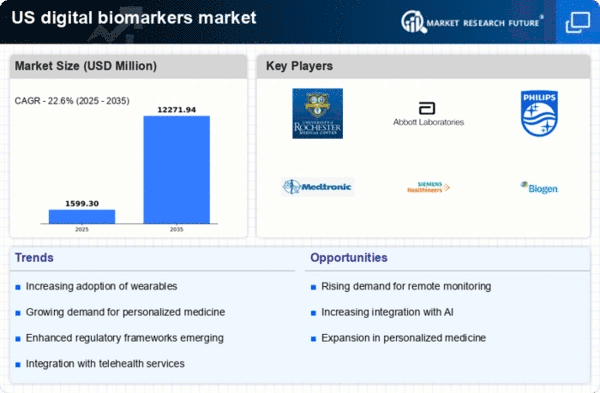Advancements in Wearable Technology
The digital biomarkers market is significantly influenced by advancements in wearable technology. Devices such as smartwatches and fitness trackers are increasingly capable of collecting real-time health data, which can be utilized as digital biomarkers. This trend is indicative of a broader movement towards continuous health monitoring, allowing for proactive management of chronic conditions. The wearable technology market is expected to surpass $60 billion by 2025, suggesting a strong correlation with the growth of the digital biomarkers market. As consumers become more health-conscious and technology-savvy, the integration of wearables into healthcare systems is likely to enhance the utility of digital biomarkers, thereby driving market expansion.
Rising Demand for Personalized Medicine
The digital biomarkers market is experiencing a notable surge in demand for personalized medicine. This trend is driven by the increasing recognition of the need for tailored treatment plans that cater to individual patient profiles. As healthcare providers seek to enhance patient outcomes, the integration of digital biomarkers into clinical practice appears to be a viable solution. According to recent estimates, the market for personalized medicine is projected to reach approximately $350 billion by 2025, indicating a robust growth trajectory. This shift towards personalized approaches is likely to propel the digital biomarkers market, as these tools provide critical insights into patient-specific responses to therapies, thereby facilitating more effective treatment strategies.
Increased Focus on Preventive Healthcare
The digital biomarkers market benefits from a heightened focus on preventive healthcare. As healthcare systems shift from reactive to proactive models, the demand for tools that can predict health issues before they escalate is growing. Digital biomarkers play a crucial role in this paradigm shift, offering insights that can lead to early interventions. The preventive healthcare market is projected to reach $200 billion by 2025, reflecting a significant opportunity for the digital biomarkers market. This emphasis on prevention not only improves patient outcomes but also reduces healthcare costs, making digital biomarkers an attractive option for healthcare providers and payers alike.
Growing Investment in Digital Health Solutions
The digital biomarkers market witnesses a surge in investment in digital health solutions. Venture capital funding and public-private partnerships are increasingly directed towards innovative technologies that leverage digital biomarkers for improved health outcomes. In 2025, investments in digital health are expected to exceed $20 billion, highlighting the growing recognition of the potential of these technologies. This influx of capital is likely to accelerate the development and commercialization of digital biomarkers, fostering innovation and expanding their applications across various therapeutic areas. As stakeholders recognize the value of data-driven healthcare, the digital biomarkers market is poised for substantial growth.
Regulatory Support for Digital Health Innovations
Regulatory support for digital health innovations positively impacts the digital biomarkers market. Regulatory bodies are increasingly establishing frameworks that facilitate the approval and integration of digital biomarkers into clinical practice. This support is crucial for ensuring the safety and efficacy of these tools, thereby enhancing their acceptance among healthcare providers. In recent years, the FDA has introduced guidelines that streamline the approval process for digital health technologies, which is likely to encourage further investment and development in the digital biomarkers market. As regulatory environments become more conducive to innovation, the market is expected to expand, offering new opportunities for stakeholders.
















